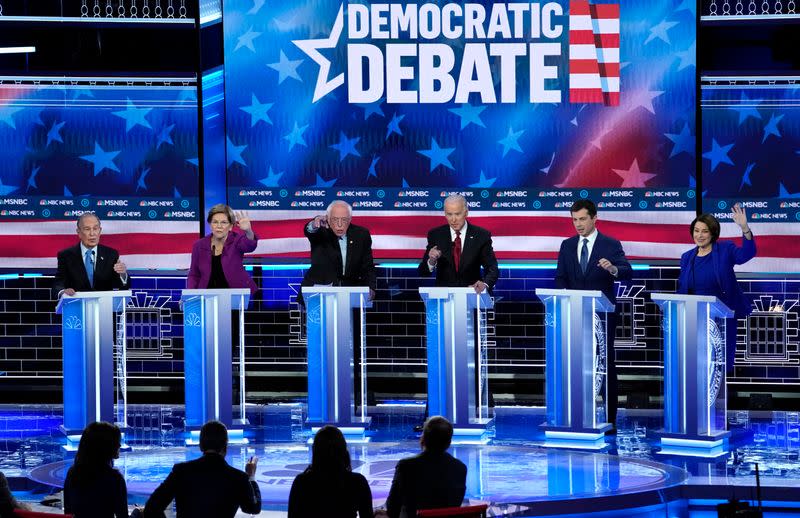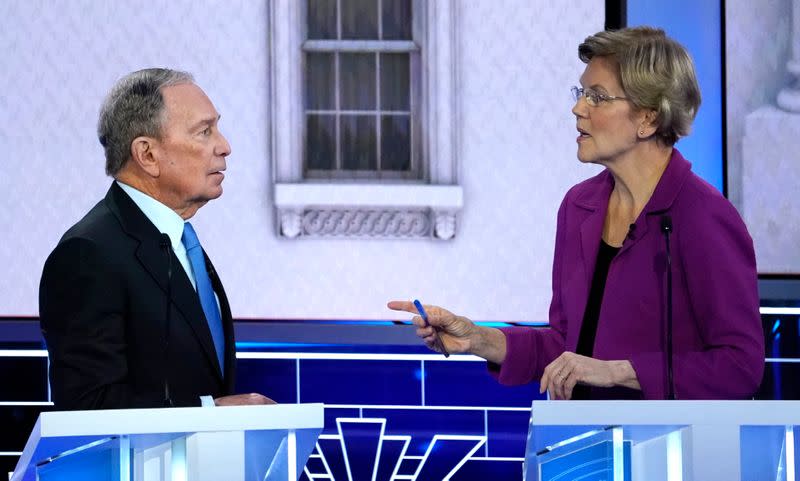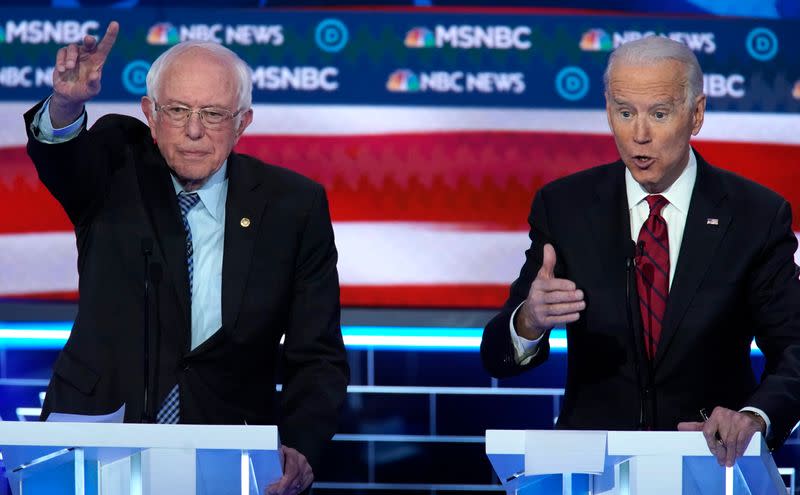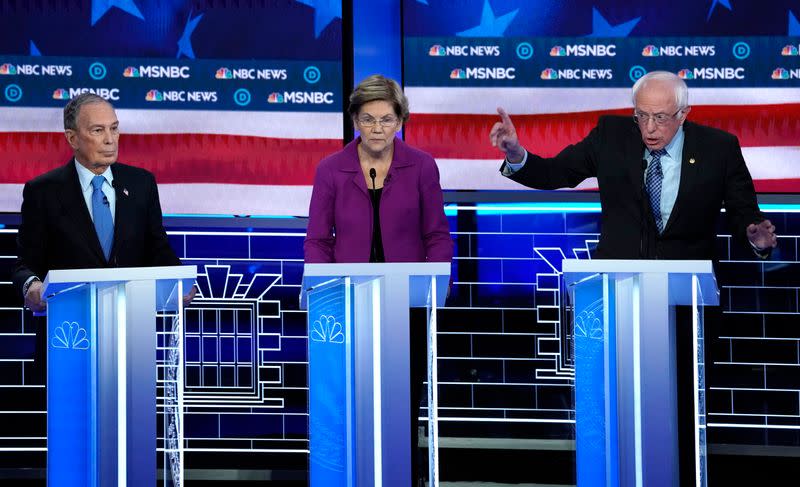Bloomberg seeks reset after rough debate debut as Democrats sprint to Super Tuesday
By Amanda Becker and Tim Reid
WASHINGTON/LAS VEGAS (Reuters) - Democratic presidential contenders began a frantic dash for votes on Thursday, as big-spending billionaire Michael Bloomberg sought to move past a bruising debate debut and several of his rivals jockeyed to be the moderate alternative to liberal front-runner Bernie Sanders.
There are just two days to go before the presidential caucuses in Nevada. Afterward, contests loom in South Carolina, followed by Super Tuesday on March 3, when voters cast ballots in 14 states, including California, Utah, Colorado and Texas.
The blistering attacks against Bloomberg on Wednesday night over his record on race, history of sexist comments and use of his fortune to push his way up in opinion polls - could damage his argument that he has the best chance of beating Republican President Donald Trump in the Nov. 3 election.
The former New York mayor, who entered the race late and will not be on primary ballots until Super Tuesday, has tried to position himself as a moderate alternative to Sanders, a senator and self-described democratic socialist. Bloomberg spent $220.6 million on his candidacy in January and $409 million to date.
Bloomberg's campaign moved to stem the fallout early on Thursday by announcing endorsements from members of Congress from New York, New Jersey and California, after saying on Wednesday night he was "just warming up."
In a nod to Senator Elizabeth Warren's charge that Democrats nominating Bloomberg to challenge Trump would be exchanging "one arrogant billionaire for another," he told a rally in Utah: "We could not be more different; I bill myself as the un-Trump."
"Look, the real winner in the debate last night was Donald Trump," Bloomberg added.
Warren, who landed early jabs during the debate related to Bloomberg's use of nondisclosure agreements for women at his company to settle lawsuits and his support while mayor of stop-and-frisk policing policies that ensnared disproportionate numbers of blacks and Latinos, remained on the offensive.
"I have really had it with billionaires ... who think their money buys them something special, so they can call women 'fat broads' and 'horse-faced lesbians,' that when somebody complains, throw a little money on it, and then put a gag in a woman's mouth," Warren said while campaigning in North Las Vegas.
Bloomberg said at the debate there were "very few" nondisclosure agreements and "none of them accuse me of anything." He said they were made consensually with the expectation they would stay private.
RISING STAKES
Wednesday's was the most-watched of the nine Democratic presidential debates so far this cycle, with about 20 million tuning in on NBC and MSNBC and 13.5 million on streaming platforms, the networks said.
For Warren, it was an opportunity to try to steady her campaign after disappointing finishes in Iowa and New Hampshire. Her campaign said it set fundraising records by bringing in $425,000 during the first hour of the debate and $2.8 million over the course of the day.
Democratic strategist Ian Sams, who worked on Senator Kamala Harris' former presidential campaign, said Warren's performance showed she "will not be going quietly into the night" and the money will keep her competitive through Super Tuesday.
Sanders, whose campaign said it raised a record $2.7 million on Wednesday, also faced some incoming fire on Wednesday night. But the debate did not settle the question of which moderate candidate is best-suited to take him on, strategists said.
"When you are the front-runner, and no one does anything to stop you, it's a good night," said Tad Devine, a former adviser to Sanders, who worked on the now-shuttered Andrew Yang campaign.
It "raises the stakes enormously," however, for Bloomberg, who is blanketing states with advertisements but has yet to show he can engage directly with voters and the media, Devine said.
Pete Buttigieg's campaign warned in a strategy memo early on Thursday that Sanders must be stopped before he amasses an "insurmountable delegate lead," arguing that Bloomberg's performance showed he was ill-equipped to do so.
Initial results from the Iowa caucuses, the nation's first nominating contest, gave Buttigieg, the former mayor of South Bend, Indiana, a one-delegate lead over Sanders. The two rivals won an equal number of delegates from the second contest in New Hampshire, although Sanders got more votes overall.
Nevada's caucuses will be the third contest in the state-by-state race to find a challenger to Trump. South Carolina holds its primary on Feb. 29. Sanders leads most recent opinion polls in both states.
Buttigieg has a town hall meeting and a fundraiser scheduled for Thursday in Los Angeles. Warren and former Vice President Joe Biden, a onetime front-runner, campaigned in Nevada and will participate in CNN town halls. Senator Amy Klobuchar is in Colorado.
(Reporting by Tim Reid and Simon Lewis in Nevada, Ginger Gibson, Jason Lange, Amanda Becker and John Whitesides in Washington, Jarrett Renshaw in Philadelphia and Trevor Hunnicutt and Joseph Ax in New York; Writing by Amanda Becker and John Whitesides; Editing by Daniel Wallis and Peter Cooney)









